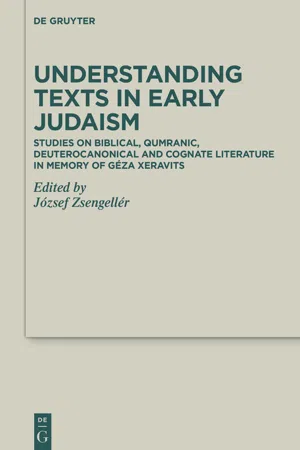
Understanding Texts in Early Judaism
Studies on Biblical, Qumranic, Deuterocanonical and Cognate Literature in Memory of Géza Xeravits
- 494 pages
- English
- ePUB (mobile friendly)
- Available on iOS & Android
Understanding Texts in Early Judaism
Studies on Biblical, Qumranic, Deuterocanonical and Cognate Literature in Memory of Géza Xeravits
About This Book
This volume remembers Géza Xeravits, a well known scholar of deuterocanonical and Qumran literature.
The volume is divided into four sections according to his scholarly work and interest. Contributions in the first part deal with Old Testament and related issues (Thomas Hiecke, Stefan Beyerle, and Matthew Goff). The second section is about the Dead Sea Scrolls (John J, Collins, John Kampen, Peter Porzig, Eibert Tigchelaar, Balázs Tamási and Réka Esztári). The largest part is the forth on deuterocanonica (Beate Ego, Lucas Brum Teixeira, Fancis Macatangay, Tobias Nicklas, Maria Brutti, Calduch-Benages Nuria, Pancratius Beentjes, Benjamin Wright, Otto Mulder, Angelo Passaro, Friedrich Reiterer, Severino Bussino, Jeremy Corley and JiSeong Kwong). The third section deals with cognate literature (József Zsengellér and Karin Schöpflin). The last section about the Ancient Synagogue has the paper of Anders Kloostergaard Petersen.
Some hot topics are discussed, for example the Two spirits in Qumran, the cathegorization of the Dead Sea Scrolls, the authorship and antropology of Ben Sira, and the angelology of Vitae Prophetarum.
Frequently asked questions
Information
Part 1: Old Testament and Early Judaism
“From the Heavens, From the Earth”
Abstract
1 Introduction
2 The Text (Hebrew, Transcription, Translation, Coherence)
2.1 Text and Versions
2.1.1 The Masoretic Text and Its Transcription
| הַ֥לְלוּ יָ֨הּ׀ הַֽלְל֣וּ אֶת־יְ֭הוָה מִן־הַשָּׁמַ֑יִם הַֽ֝לְל֗וּהוּ בַּמְּרוֹמִֽים׃ הַֽלְל֥וּהוּ כָל־מַלְאָכָ֑יו הַֽ֝לְל֗וּהוּ כָּל־צְבָאוֹ׃ הַֽ֭לְלוּהוּ שֶׁ֣מֶשׁ וְיָרֵ֑חַ הַ֝לְל֗וּהוּ כָּל־כּ֥וֹכְבֵי אֽוֹר׃ הַֽ֭לְלוּהוּ שְׁמֵ֣י הַשָּׁמָ֑יִם וְ֝הַמַּ֗יִם אֲשֶׁ֤ר׀ מֵעַ֬ל הַשָּׁמָֽיִם׃ יְֽ֭הַֽלְלוּ אֶת־שֵׁ֣ם יְהוָ֑ה כִּ֤י ה֭וּא צִוָּ֣ה וְנִבְרָֽאוּ׃ וַיַּעֲמִידֵ֣ם לָעַ֣ד לְעוֹלָ֑ם חָק־נָ֝תַ֗ן וְלֹ֣א יַעֲבֽוֹר׃ הַֽלְל֣וּ אֶת־יְ֭הוָה מִן־הָאָ֑רֶץ תַּ֝נִּינִ֗ים וְכָל־תְּהֹמֽוֹת׃ אֵ֣שׁ וּ֭בָרָד שֶׁ֣לֶג וְקִיט֑וֹר ר֥וּחַ סְ֝עָרָ֗ה עֹשָׂ֥ה דְבָרֽוֹ׃ הֶהָרִ֥ים וְכָל־גְּבָע֑וֹת עֵ֥ץ פְּ֝רִ֗י וְכָל־אֲרָזִֽים׃ הַֽחַיָּ֥ה וְכָל־בְּהֵמָ֑ה רֶ֝֗מֶשׂ וְצִפּ֥וֹר כָּנָֽף׃ מַלְכֵי־אֶ֭רֶץ וְכָל־לְאֻמִּ֑ים שָׂ֝רִ֗ים וְכָל־שֹׁ֥פְטֵי אָֽרֶץ׃ בַּחוּרִ֥ים וְגַם־בְּתוּל֑וֹת זְ֝קֵנִ֗ים עִם־נְעָרִֽים׃ יְהַלְל֤וּ׀ אֶת־שֵׁ֬ם יְהוָ֗ה כִּֽי־נִשְׂגָּ֣ב שְׁמ֣וֹֹ עַל־אֶ֥רֶץ וְשָׁמָֽיִם׃ לְבַדּ֑וֹ ה֝וֹד֗ו וַיָּ֤רֶם קֶ֨רֶן׀ לְעַמּ֡וֹ תְּהִלָּ֤ה לְֽכָל־חֲסִידָ֗יו לִבְנֵ֣י יִ֭שְׂרָאֵל עַֽם־קְרֹב֗וֹ הַֽלְלוּ־יָֽהּ׃ | 1 2 3 4 5 6 7 8 9 10 11 12 13 14 | 1 haləlû yāh haləlû ʾet-YHWH min-haššāmayim haləlûhû bammərômîm 2 haləlûhû kol-malʾākāyw haləlûhû kāl-ṣəbāʾô 3 haləlûhû šemeš wəyārēaḥ hallûhû kol-kôkəbê ʾôr 4 haləlûhû šəmê haššāmāyim wəhammayim ʾăšer mēʿal haššāmāyim 5 yəhaləlû ʾet-šēm YHWH kî hûʾ ṣiwwâ wənibrāʾû 6 wayyaʿămîdēm lāʿad ləʿôlām ḥoq-nātan wəlōʾ yaʿăbôr 7 haləlû ʾet-YHWH min-hāʾāreṣ tannînîm wəkol-təhōmôt 8 ʾēš ûbārod šeleg wəqîṭôr rûaḥ səʿārâ ʿōśâ dəbārô 9 hehārîm wəkol-gəbāʿôt ʿēṣ pərî wəkol-ʾărāzîm 10 haḥayyâ wəkol-bəhēmâ remeś wəṣippôr kānāp 11 malkê-ʾereṣ wəkol-ləʾummîm śārîm wəkol-šōpəṭê ʾāreṣ 12 baḥûrîm wəgam-bətûlôt zəqēnîm ʿim-nəʿārîm 13 yəhaləlû ʾet-šēm YHWH kî-niśgāb šəmô ləbaddô hôdô ʿal-ʾereṣ wəšāmāyim 14 wayyārem qeren ləʿammô təhillâ ləkol-ḥăsîdāyw libnê yiśrāʾēl ʿam-qərōbô haləlû-yāh |
2.1.2 Notes on the Hebrew Text and an English Translation
Table of contents
- Title Page
- Copyright
- Contents
- Preface: In memoriam Géza G. Xeravits (1971–2019)
- Part 1: Old Testament and Early Judaism
- Part 2: Qumran
- Part 3: Deuterocanonica
- Part 4: Cognate Literature
- Part 5: Antique Synagogue
- Index of Modern Authors
- Index of Sources
- Index of Subjects